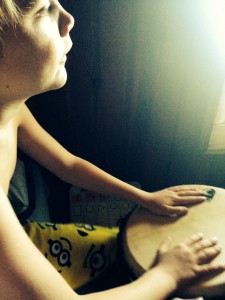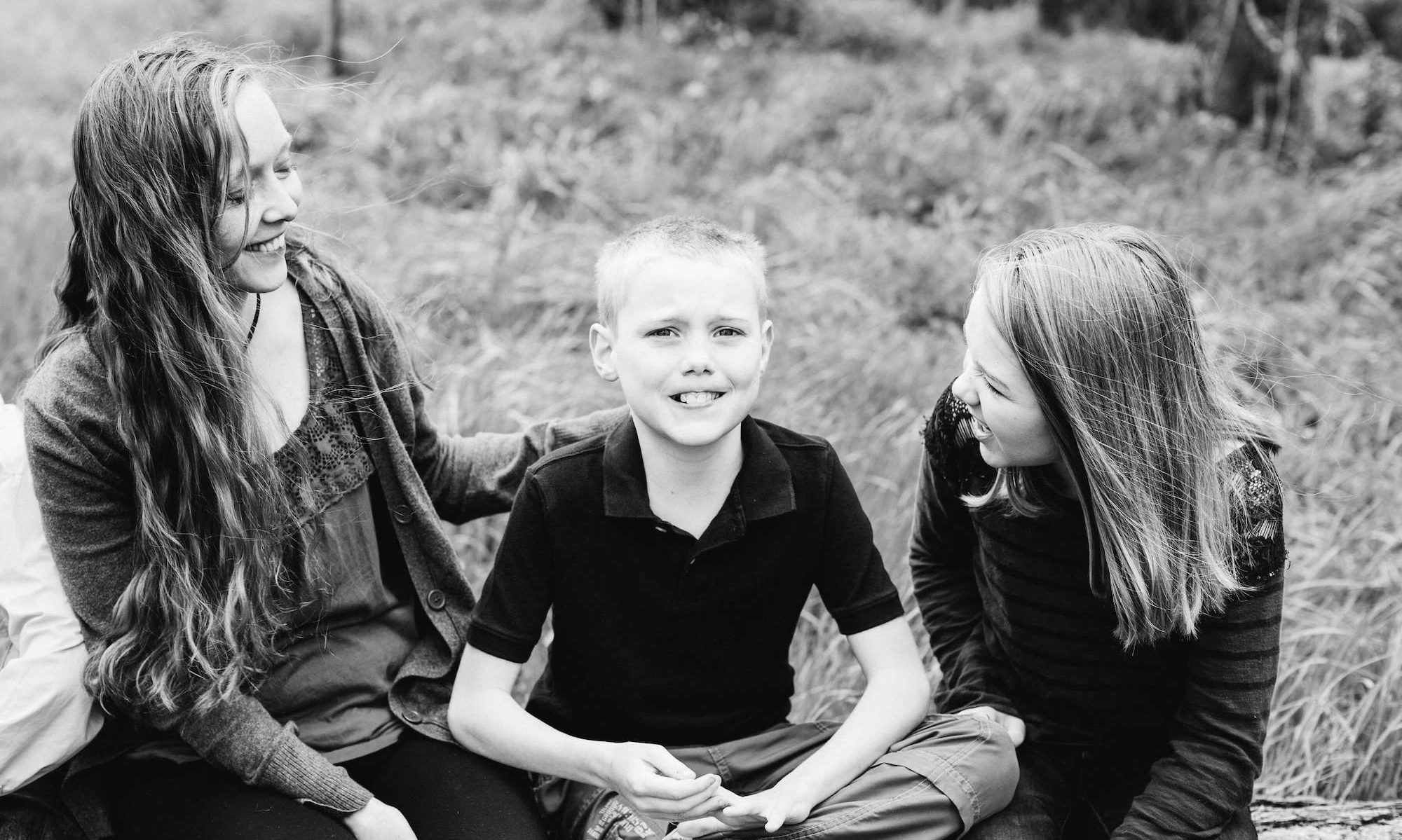 We’ve been on this journey for quite some time now. Our boy Jackson is a big 9-year-old now, and life hasn’t slowed down yet. So this is a major catch-up post. Two years ago, we were still hoping for one word requests for tickles and waffles. Last summer we made great strides with 3 simple home goals that replaced sending him to Summer School: independently buckling his seat belt, riding a bike with training wheels, and treating everything as communication (including meltdowns and echolalia).
We’ve been on this journey for quite some time now. Our boy Jackson is a big 9-year-old now, and life hasn’t slowed down yet. So this is a major catch-up post. Two years ago, we were still hoping for one word requests for tickles and waffles. Last summer we made great strides with 3 simple home goals that replaced sending him to Summer School: independently buckling his seat belt, riding a bike with training wheels, and treating everything as communication (including meltdowns and echolalia).
We had our first conversation via echolalia that went something like this:
Jack: Cars 2 or Lion King 1 & 1/2? (This is his prompt for me. He looks sideways, waiting for me to ask him.)
Me: Which one do you like better? Cars 2 or Lion King 1 & 1/2?
Jack: Cars 2
Me: I like Cars 2 better too.
Jack: Cars 2. Coming soon to theaters.
Me: Do you remember when we watched Cars 2 in the theater on the big screen?
Jack: (Huge smile.)
Me: That was really fun.
Jack: Lion King 1 & 1/2. Coming soon to theaters?
Me: Oh, man. I wish Lion King 1 & 1/2 was coming to theaters, but that’s an old movie. It’s not in the theaters anymore.
Jack: (sadly) Lion King 1 & 1/2 now available on Disney DVD and video.
Me: Yep. It’s only on DVD and video.
Decoding these cryptic conversations requires tons of filling in the blank, wild guessing, and studying what grabs his attention, but those scripted lines became our starting point for more conversations that also included independent speech. Like I said, it wasn’t one single method, it didn’t happen overnight, and we still have so far to go, but here are a few of the strategies that just seem to work for us:
1. I found a testimony of hope to squash the myth that Jackson had missed his golden window of opportunity for meaningful speech. The impetus to press through these hollow echoes of his favorite movie trailers and hope that we could connect in some meaningful way, the conviction that he was truly capable of more than just felt need requests and stimmy language, came from another parent of a child on the spectrum. One of the moms in our parent support group shared about her now 14-year-old daughter who didn’t begin talking until 3rd grade. The intense relief I felt after she shared this made me realize the unintentional pressure and discouragement I had placed on myself thinking that if Jack wasn’t speaking by the time he turned five, he wouldn’t. Ever. Thank God for plasticity and regeneration, and the ability to learn something new! I felt hope explode again. It had been too long since the last explosion. I used to hunt down testimonials of success, but I hadn’t done it in a long time. Besides, hearing it from a real live person who lives in my town was 99.9% more powerful than reading it online. Go find a parent support group, or start one. Ours has never been big, but it has meant a lot to the 3-6 people who come.
2. I started treating everything as communication. Last summer, after some previous bad experiences with our busing system as well as summer school, we opted out of ESY (Extended School Year) during the summer months. We chose to do schooling at home, but I really didn’t think bringing home a bunch of worksheets from school was the answer. So after choosing the three very practical goals I mentioned earlier, treating everything as communication became an all-day challenge (Echolalia, tantrums, sounds, flapping, the whole bit). First listen. Then decode. Then respond. Give him words to match his actions. Expand on his echoes. After Jackson flops on the ground and fusses, “I see you don’t want to brush your teeth. You can ask for one more minute.” When Jackson’s echoing, “Cars 2” over and over again, “Cars 2? That’s a great movie! I love how Mater gets rockets so he can fly!” Somehow I knew that all that echolalia was important, not a thing to be stopped, but practice for meaningful speech. His speech is often ten times clearer when he’s echoing in Finn McMissile’s British accent than when he’s asking for cookies (something he does every day). And in its own right, to Jackson, his echoed movie lines are incredibly meaningful. We’re exploring the depth of meaning in his echolalia now…but that’s for another post.
3. We ask Jackson to use “all his words.” Dude. That boy would be happy to only have to use one or two words to get what he wants or needs, but he can use more. It just takes a ton of effort to make his mouth say a full sentence. His amazing aide at school has been awesome at requesting “all of his words” consistently, and it inspired me to do the same. Now “Waffles” is magically transformed into, “Mommy, I want waffles please.” just by that simple prompt. And we thank and applaud him for going the extra mile every time because it requires so much concentration to get every word out.
4. Communication devices, PECS, and other visuals were all but replaced by a low-tech white board and marker. Last school year, his teacher started using an iPod with a communication app on it, and I think it helped Jackson see and hear the words exactly the same way for a while again, and to clearly see what was coming next and what his choices were. They still use a visual schedule and PECS to request food/break items at school, but I get the sense that Jackson is feeling too old for the visuals. He may still need them to remember his options, but he’s had them since preschool. Using the whiteboard was a strategy the inspiring parent I mentioned earlier had used and also Emily Colson in Dancing With Max. Now I’m a lousy artist, but the white board is super flexible. We can talk about everything under the sun and not have to fumble through app pages or the tiny square pictures that get lost in the couch and under the fridge. And we can draw the things he loves to talk about. Writing Disney movie titles is the current obsession, and he’s practicing fine motor control, spelling, and letters. Writing these titles repeatedly has been the majority of our summer school this year.
5. We became intentional about spending one-on-one time with Jackson. Again based on the testimony of friends, we were inspired to look at the Son Rise Program. This gentle, follow-his-lead kind of program which holds personal connection above academic performance just feels…right. So six mornings a week, Jason or I join him upstairs to give foot messages, write movie titles, draw Mike and Sully, talk about all things Pixar, and make silly faces in the mirror. Joining him in his world and slowly, gently asking him to join ours. His smile, eye contact, and yes, some words tell us this time is well worth it…that and the fact that after two hours, he doesn’t want to leave that room.
There are many things that have happened these last two years, but the highlight has been telling my hubby, “You know you can’t call him ‘nonverbal’ anymore.” That and my own renewed hope. We could all use some of that, right?

Thanks for posting the update.
Thanks for keeping me in touch. I’m grateful for your love for Jackson and perseverance in seeing the seemingly slow answers to prayer. God will continue to answer your cries for help. Thanks for your openness and humility in sharing. It has been and will be an inspiration to many like me.
This is so encouraging, Sarah. I didn’t know he’d progressed so far. There’s a big grin creasing my cheeks now!